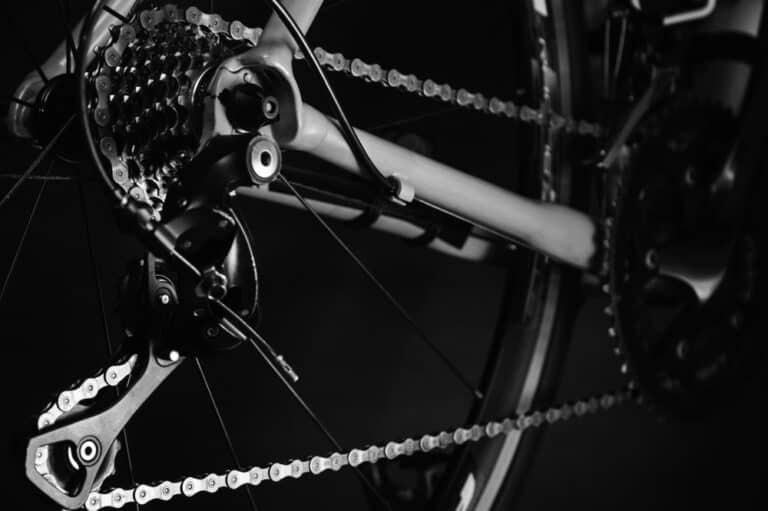Can You Convert Road Bike To Disc Brakes?

Editorial credit: Vitalii Vitleo / Shutterstock.com
As more and more manufacturers and racing teams opt for disc braking systems on their road bikes and regular road bikes and more cyclists look to use this braking system, you may be wondering whether you can convert your road bike to disc brakes.
Realistically, you could not convert your road bike to disc brakes as there are too many structural changes you would have to make to the frame, axles, wheels, braking levers, and shifters, and this would be very costly and mostly ineffective.
Because you cannot just install disc brakes on a road bike setup for rim braking, we need to look at how disc brakes and rim brake systems work and the pros and cons of each to understand why you could not convert your road bike to disc brakes.
What Are The Main Differences Between Rim Brakes And Disc Brakes?
To better understand the process of converting your road bike to disc brakes, you need to understand the mechanical and functional differences between these two braking systems.
Rim brakes are mechanical and use the rim as the rotor, while disc brakes have their own rotor attached to the fork. Rim brakes use a simple leverage cable system that causes the brake pads to close on the rim when contracted by the brake lever.
Disc brakes are mostly hydraulic, and pulling the brake lever causes a non-compressible fluid to expand and activate the brake pads around the disc.
Herein lies the first major hurdle when converting your road bike to disc brakes. The frame and forks are not designed to take disc brakes, and you would need to add disc brake wheels with the brake hubs attached to act as the brake rotors.
Rim brakes attach to a hole in the frame or the fork, while disc brakes require a durable rotor to deliver the braking force while the bike is moving, and the brake pads and calipers need to be attached to the fork close to the wheel hub.
Disc Brake Bikes Have Different Axles
Standard rim brake road bikes typically have the quick-release axle, and while this has been used on disc brake road bikes, most road bikes using disc brakes have the thru-axle configuration as this provides a more sturdy hold and stiffness.
The thru-axle structure is borrowed from mountain bikes and assists with the braking power delivered by the disc brake system. While you could opt for quick-release axles on your road bike, most modern road bikes using disc brakes would use the thru-axle setup.
Unless you change your axle on your rim-brake road bike, converting to disc brakes will not be possible.
Hydraulics Vs. Mechanical Braking Systems
Returning to the braking infrastructure, rim brakes are much simpler and only require braided cables to activate the calipers and pads. While you get ‘mechanical disc brakes, which use lines to operate the calipers, the most common disc brake systems are hydraulic.
The hydraulic system used with most disc brakes requires the brake lever and shift to have an internal ‘bladder’ for storing the brake fluid, much like the braking systems found on cars. You would have to buy and install these components to convert your road bike to disc brakes, which is neither practical nor affordable.
The hoses that carry the hydraulic fluid to the calipers and pads would have to be installed as well, and again, the fundamental structure of a rim-brake road bike is not geared to accept and accommodate a disc brake system.
This set of components is sold as a unit and is designed to fit on frames that are made to utilize the disc braking system and could not be added to a road bike equipped with mechanical brakes.

Disc Brakes Vs. Rim Brakes – Pros And Cons
If your existing road bike has rim brakes, ask yourself why you want to convert it to disc brakes. For starters, rim brakes are lighter and cheaper and don’t require as much maintenance as disc brakes.
They are effective, and if you have a problem with a pad or caliper during a race, it is easier to sort that out on the fly than having to deal with a major hydraulic failure. If you are doing competitive racing, having lighter brakes will take the weight off the bike, which is always welcome.
Disc brakes are more complex, but they do have greater stopping power than rim brakes, and this is something that mountain bikers have known for decades!
They are more reliable in wet conditions, give you a faster ride as you have higher confidence in braking at speed, plus they have less wear and tear on the wheels.
But, they are also not transferrable, meaning you can’t move them from your road bike designed for disc brakes to one designed for rim brakes, and they will be more expensive to buy, maintain and replace.
Another consideration is that because rim brakes require a true rim to be effective, disc brakes don’t, as they use the rotor for braking and not the rim, and there is more clearance on the rim, meaning that you could use wider tires on your disc-brake road bike.
Could I Convert My Road Bike To Disc Brakes?
Suppose you were prepared to renovate your existing frame, braking system, levers, shifters, wheel hubs, axles, and forks. In that case, you could conceivably convert your road bike to disc brakes, but this would be prohibitively expensive and time-consuming.
The alterations needed would have to be done by a very experienced bike mechanic, and after all is said and done here, you may well find afterward that the overall performance before conversion may have been better!
A better choice is to leave the road bike the way it is and invest in a new bike that comes complete with the disc braking system, as you will then be able to experience the braking power of disc brakes as they were designed to be.
Conclusion
It would not be advisable to convert your road bike to disc brakes as the changes needed to accommodate a hydraulic braking system would be excessive and impractical. There is no guarantee that all of that would be beneficial.
Because disc brakes are safer and more powerful, you can use this as an excuse and a good reason to buy a new bike!
Resources
- https://www.roadbikerider.com/converting-your-bike-to-a-hybrid-disc-rim-brake-setup-part-1-d2/
- https://www.bikeradar.com/features/road-disc-brakes-everything-you-need-to-know/
- https://www.bikeexchange.com.au/blog/can-i-fit-disc-brakes-to-my-road-bike
- https://www.realbuzz.com/articles-interests/cycling/article/the-pros-and-cons-of-using-disc-brakes-on-a-road-bike/







